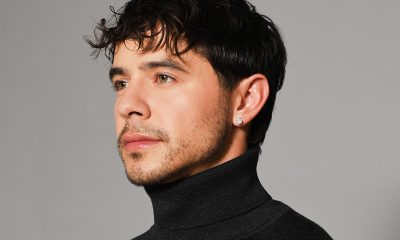a&e features
10 hidden gems by George Michael
Shocking Christmas death sparks reappraisal of out singer’s lesser-known track
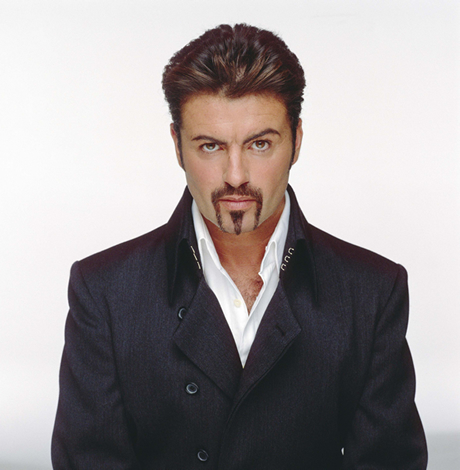
Given the shocking death of pop superstar George Michael on Christmas Day at the age of 53, it’s not surprising that his mourning fans have been listening through his outstanding catalog of music, which stretches more than 30 years as a solo artist and as one half of the duo Wham!, and reliving their favorite moments from the gifted musician.
Most everybody knows his many monster hits: “Wake Me Up Before You Go-Go,” “Careless Whisper,” “Everything She Wants,” “I Knew You Were Waiting for Me” (with Aretha Franklin), “Faith,” “Father Figure,” “One More Try,” “Monkey,” “Playing for Time” and “Don’t Let the Sun Go Down on Me” (with Elton John) were all No. 1 singles in the U.S.
Other major singles include “I Want Your Sex,” “I’m Your Man,” “A Different Corner,” “Freedom ‘90,” “Too Funky” and “Fastlove.” While most readers will be familiar with these, there’s another side to George Michael’s music that might be ripe for discovery by fans who haven’t delved fully into his extensive body of work. Here are 10 lesser-known George Michael gems you may not know.
“Battlestations” (1986)
By the time Wham! made it big, George Michael was already eyeing a solo career. The global smash “Careless Whisper” was Michael’s first solo single even though in the U.S. it was credited to Wham! Featuring George Michael and it was included on Wham!’s chart-topping second album, “Make it Big.”
After announcing Wham!’s dissolution in early 1986, Michael promised one final album with the duo and a farewell concert. Wham! went out with a bang at a massive show on June 28, 1986 at Wembley Stadium. The last album is essentially a compilation of a few newly recorded tracks, assorted singles and leftovers (including the now-ubiquitous holiday single “Last Christmas” and the No. 3 smash “I’m Your Man). In North America the album was dubbed “Music from the Edge of Heaven,” while elsewhere it was called “The Final” and featured a different track listing.
One of the highlights is the lithe and funky “Battlestations,” a stripped down electronic-pop gem that recounts a rocky romance similar in theme to the chart-topping “Everything She Wants.” “Battlestations” points to the more mature adult-themed pop that Michael would explore on his classic debut solo album “Faith.”
“They Won’t Go When I Go” (1990)
George Michael was a huge Stevie Wonder fan and covered several of his songs over the course of his career. The finest is his stunning take on the ballad “They Won’t Go When I Go,” which Wonder released on his 1974 album “Fulfillngness’ First Finale.” Michael’s recording, featured on his second solo album “Listen Without Prejudice, Vol. 1,” is a powerfully rendered version with a dynamic multi-layered vocal performance over a simple piano accompaniment. It’s one of George Michael’s most spellbinding tracks, a true testament to his power as a vocalist, arranger and producer of the highest caliber.
“Do You Really Want To Know?” (1992)
In the midst of George Michael’s legal battle with Sony Music over his perception that the corporate behemoth failed to adequately promote his downbeat 1990 album “Listen Without Prejudice, Vol. 1,” Michael donated three dance tracks that were originally intended for a planned upbeat sequel to the intense and serious Vol. 1 to the AIDS charity compilation “Red Hot + Dance.”
One track, the high-energy “Too Funky,” became a substantial hit, but his two other contributions to the album, “Happy” and the uber-catchy “Do You Really Want to Know?,” are worth checking out as well. They offer a taste of what a terrific listening experience “Listen Without Prejudice, Vol. 2” might have been.
A fourth track, “Crazyman Dance,” was included as a B-side on the “Too Funky” single. Michael had been planning a deluxe reissue of “Listen Without Prejudice, Vol. 1” prior to his death, and while it’s unknown if the project will still see the light of day, it would be fantastic indeed if the complete unreleased “Vol. 2,” including these excellent overlooked dance tracks, is included in the package.
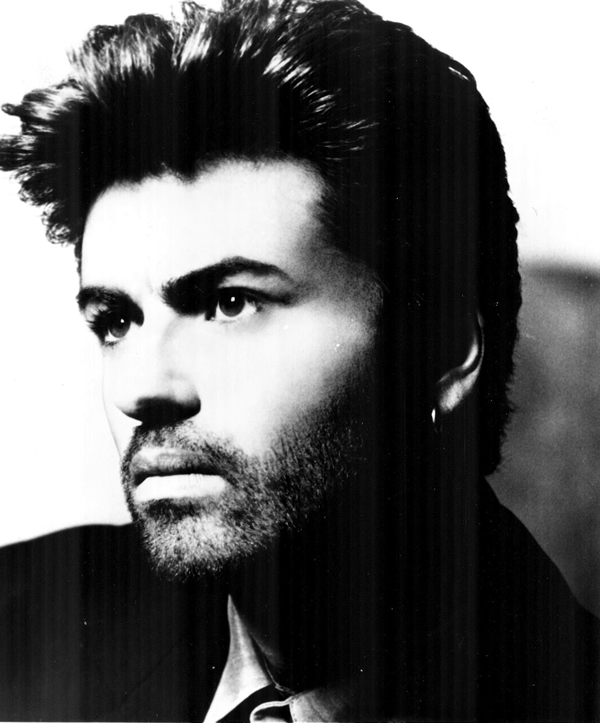
An early ‘90s record company photo of the late George Michael. (Photo by Bradford Branson; courtesy Columbia Records)
“You Have Been Loved” (1996)
George Michael’s 2006 album “Older” was his first in six years, and his return after a high-profile feud with Sony Music essentially stalled his career for half a decade. While the first single “Jesus to a Child” was met with initial excitement in the U.S., and its follow-up “Fastlove” became Michael’s final major American hit, the album performed markedly worse in the U.S. than in his native U.K. and other countries internationally.
The downbeat tone of the album, largely inspired by the 1993 death of Michael’s lover Anselmo Feleppa of an AIDS-related brain hemorrhage, did not translate well to U.S. radio and many of the low-key but exquisite tracks that became popular internationally were overlooked in America. One in particular is the stunning and heartbreaking tribute “You Have Been Loved,” a sublime recording brimming with genuine emotion. Michael delivers one of his greatest vocal performances on a song that shows his heart firmly on his sleeve.
“If I Told You That” (duet with Whitney Houston, 2000)
Whitney Houston originally released the smooth and funky R&B gem “If I Told You That” for her smash 1998 album “My Love is Your Love.” Two years later she re-recorded it for inclusion on a greatest hits set as a duet with George Michael. His soulful vocal fits the vibe of the song perfectly and he and Houston make a dynamic pair, generating plenty of chemistry.
The video, featuring Houston and Michael dancing and singing the song together, looking and sounding their best, is startlingly poignant for such an upbeat song. It seems to speak directly to the waste of extraordinary talent represented by the early deaths of two of pop music’s most shining stars. Had the track been released a decade earlier, it surely would have soared to the top of the American pop charts. In 2000, at a time when neither Houston nor Michael were riding high on the pop charts as in their heyday, the song was a minor hit internationally but in the U.S. it was essentially ignored.
“The Long and Winding Road” (2002)
Michael performed this sublime cover of the Beatles’ 1970 classic “The Long and Winding Road” for a 1999 concert in tribute to Paul McCartney’s late wife Linda, who had died after a long battle with cancer in 1998. Michael later included his recording as one of the B-sides to this sexy U.K. dance single “Freeek!” Particularly in the later part of his career, Michael often relied upon covers of some of his favorite songs and he was a gifted interpreter of other artists’ work. This smooth and empathetic vocal on the Beatles’ final single lends it a poignancy and gravitas that fits the somber occasion for which it was performed.
“John and Elvis Are Dead” (2004)
George Michael’s final studio album, “Patience,” was a substantial hit internationally with several chart singles, but in the U.S. it sank without a trace rather quickly. “Amazing” and “Flawless (Go to the City)” were hits in American clubs, but Top 40 radio unfortunately no longer had interest in Michael.
One of the album’s high points is the emotional ballad “John and Elvis Are Dead,” a moving reflection on the senseless loss of some of the world’s greatest sources of light and talent. With a sweet vocal by Michael and a video that features video clips of Presley, Lennon and others gone too soon, the song’s emotional impact is only heightened by the realization that we can now include Michael himself in the recitation of shining stars so important to so many people that the universe allowed to slip away far too young.
“An Easier Affair” (2006)
A quarter century after forming Wham! with his former school-mate Andrew Ridgeley, Michael released his elaborate multi-disc career retrospective “Twenty-Five.” The collection gathered most of his big hits, a few new recordings and a disc of rarities and B-sides.
“An Easier Affair” is a song newly recorded for the project, a slick upbeat dance-pop number that was a substantial hit internationally but was completely passed by in the U.S. It had been a decade since George Michael had scored a hit in America (“Fastlove” in 1996) so perhaps it’s not surprising the song, despite its commercial sheen and catchy upbeat melody, was neglected by American radio and MTV. The uplifting, gay-positive lyrics probably didn’t help: “I told myself I was straight/But I shouldn’t have worried/Cause my maker had a better plan for me.”
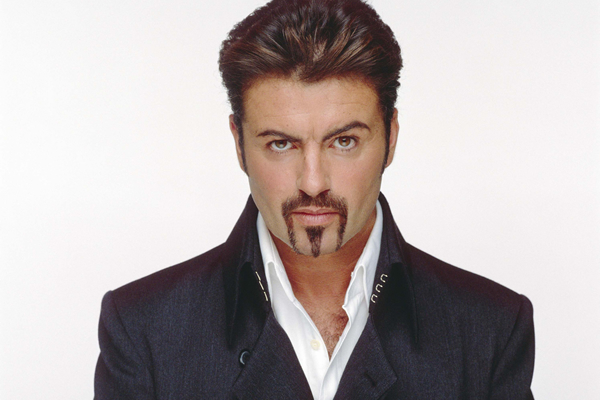
A photo used to promote George Michael’s 2008 concert at the Verizon Center for his ’25 Live Tour’ in 2008. (Photo courtesy Live Nation)
“White Light” (2012)
After focusing mostly on downbeat material and covers in recent years, after a 2011 health scare left him in the hospital for a month with a dangerous bout of pneumonia, Michael returned the following year with the kinetic electro-pop “White Light.”
The harrowing song seems to take on his lifestyle of recent years, which had been marked by drug arrests and health problems. It was a declaration that he was still here and ready to take on the world set to a sleek and modern electronic beat. It’s one of his most cunningly constructed singles and should have marked his triumphant return to the mainstream.
Alas, the single was all but ignored in America and the album that was planned in its wake never appeared. “White Light” was Michael’s final original studio single, ironic given its determination that “tomorrow is mine.” He was trying, which makes his shocking loss only a few years later all the more heartbreaking.
“Let Her Down Easy” (2014)
George Michael’s final album was 2014’s “Symphonica,” a collection of some of his original material and an excellent selection of covers performed live at the Royal Albert Hall with orchestral arrangements on his Symphonica Tour of 2011-2012. “Let Her Down Easy” was the album’s single and, although it was obviously impossible to imagine at the time, it would end up being his last.
The original recording, a delicate ballad by Terence Trent D’arby from his superb 1993 album “Symphony or Damn,” is hard to top, but Michael comes close with his gorgeous and empathetic vocal over a piano accompaniment with subtle strings. Michael’s supple vocal performance is front and center, as strong and beautiful as ever. His talent was still blazing and undiminished even to the very end of his recording career.
a&e features
From Prohibition to Pride: Queering the District podcast reveals local LGBTQ history
The new podcast explores the hidden history and enduring impact of queer spaces in Washington, D.C.
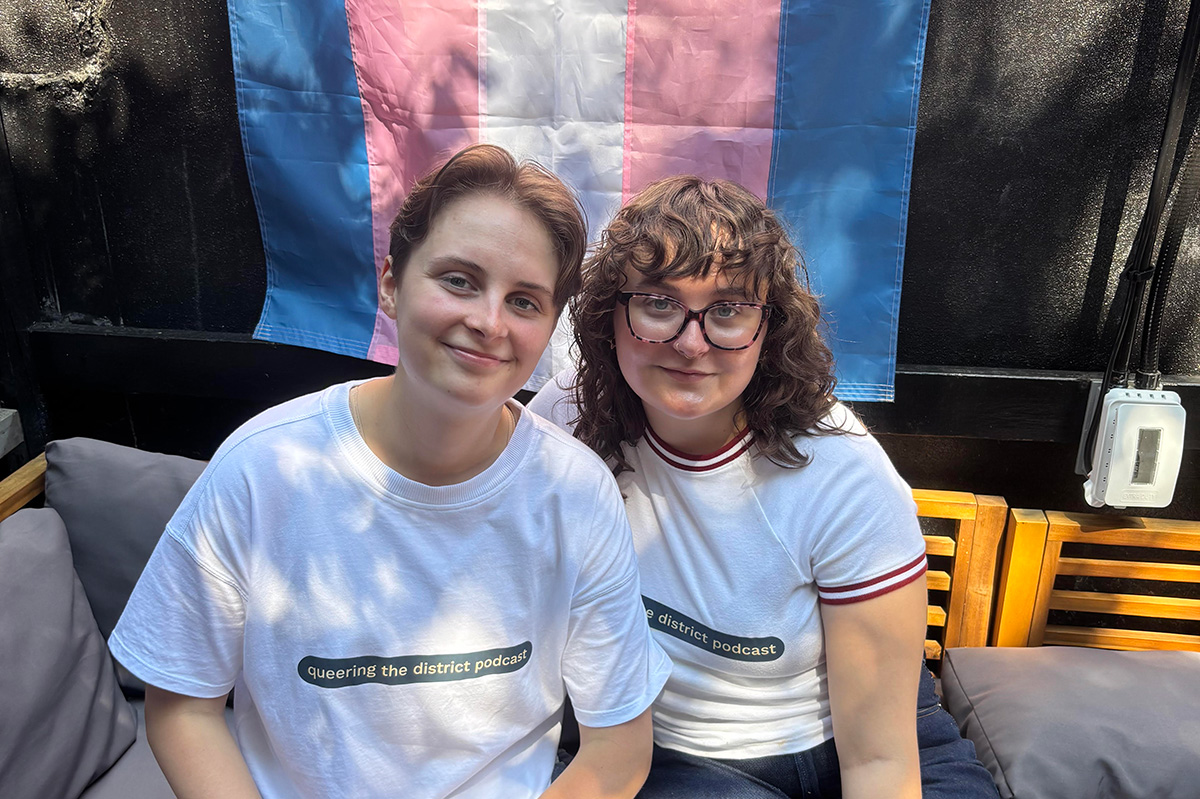
On June 25, as Pride month inched toward its end, three queer creators launched an ambitious project to honor the spaces that built D.C.’s LGBTQ community—and connect them to today’s queer life. The first episode of their podcast, Queering the District, hit streaming platforms that day, aiming to spotlight what host and co-creator Abby Stuckrath calls “third places”: bars, clubs, and gathering spots that have served as hubs for queer life across the city.
Each episode of the 10-part series delves into a different piece of D.C.’s queer past—from landmark clubs to untold personal stories—told through the voices of drag legends, activists, DJs, historians, and patrons who lived it. The show also threads together personal experiences from today’s community, bringing the listener on an auditory journey from Prohibition-era speakeasies to contemporary nights out at places like As You Are or Saints & Sinners.
Abby Stuckrath, alongside her sibling Ellie Stuckrath, and producer Mads Reagan, make up the podcast’s creative team. A recent journalism graduate of American University, Abby told the Blade that her passion for queer storytelling began during college—and that D.C. itself played a defining role in shaping her queer identity.
“I went to American University. I graduated last year and studied journalism. When I was in school, I always wanted to focus on queer stories – especially in D.C., because I’m from Denver, Colorado, I’ve never lived in a place like this before. D.C. has always just kind of been a place I call home when it comes to my queer identity.”
But breaking into the media to tell those stories wasn’t easy. Stuckrath quickly learned that editorial support—and funding—for queer-focused projects is limited. So she decided to do it her own way.
“I kind of found out that if you want to tell stories, you kind of have to do it on your own– especially when it comes to queer stories. There’s not a lot of people begging for us to talk about queer people and to pay you for it. So I was like, ‘Okay, let’s just do it on my own.’”
The idea for the podcast first took root in conversations with Ellie, Abby’s sibling and biggest supporter. Ellie had also moved to D.C. to find more space to explore and express their queer and gender identities. Together, the two began shaping a vision that would combine storytelling, sound design, and grassroots community input.
“I was like, ‘I don’t know what exactly I want to do yet, but I want it to be queer, and I want it to be about D.C., and it’s going to be called Queering the District, and we’re going to find out what that means.’ And Ellie is my biggest supporter, and my best friend. And they were like, ‘Hell yeah. Like, let’s do this.’ And so we decided to just do it together.”
The name stuck—and so did the mission. The team began researching queer D.C. history and found a city overflowing with stories that had rarely been documented, especially in mainstream archives.
“We started looking up the history of queer culture in D.C., and it kind of just clicked from there,” Stuckrath said. “I did not know anything about how rich our history is in the city until one Google search, and then I just kept learning more and more. I was kind of pissed because I studied gender studies in school in D.C. and didn’t learn shit about this.”
Season one focuses on the role of third places—non-work, non-home spaces where queer people could gather, exist fully, and build community.
“Third places have always been the epicenter of queer life… places outside of just your own personal home, because sometimes that isn’t a safe place. And of course, the work most commonly in the past and still today, isn’t a safe place for queer people to be full of themselves. So like, bars were the first place for queer people to really thrive and meet each other.”
To make the show participatory, Queering the District includes a twist: a voicemail line where anyone can call in and share a memory or question. The team calls the phone “Fifi”—a nod to the kind of retro guestbooks often used at weddings, but reimagined for queer nightlife and history.
“We wanted to find a way for people to share their stories with us anonymously… so even though we start in Prohibition, we wanted to connect it to now—like, those people who were singing jazz to each other in a white queer bar are connected to you singing karaoke on a Sunday night at your favorite gay bar. We’re all interconnected by this third place of queer bars in D.C.”
Those connections are emotional as well as historical. While building the series, one realization hit Stuckrath particularly hard: the immense loss of queer spaces in D.C., especially in neighborhoods that have since been heavily redeveloped.
“Every time I go to a Nats game, I think about, well, this just replaced five gay bars that used to be here. It used to be the home of Ziegfeld’s… Tracks, which was almost 2,000 square feet, with a volleyball court in the back, a fire pit, and iconic light show. I just didn’t know that we had that, and it made me sad for the queer elders that are in our city now who walk the streets and don’t see all those places they used to call home.”
That sense of loss—alongside the joy and resilience of queer community—is what the show aims to capture. As the podcast continues, Abby hopes it serves as both a celebration and an educational tool, especially for young LGBTQ people arriving in D.C. without realizing the queer foundations they’re walking on.
“D.C. is a unique city, and specifically young queer people who are hoping to move to the city—to know that you’ve got to know your history to be here. I hope this serves as an easier way for you to consume and learn about queer history, because queer history defines how we move in life.”
And for all the voices still left out, Abby is clear: this podcast is an open door, not a final word.
“This is a perfectly imperfect podcast. We should just be a starting point. We shouldn’t be the ending point.”
New episodes of Queering the District drop every Wednesday on all major platforms.
a&e features
Doug Spearman takes his chance
‘Noah’s Arc: The Movie’ debuted on Paramount+ last month

There’s no question that when Patrik-Ian Polk’s series “Noah’s Arc” premiered on Logo 20 years ago, it was a groundbreaking creation. The story of a group of Black gay men and their wonderful friendship. The titular arc was that of the cute main character, Noah (Darryl Stephens), and his close-knit circle of friends, including Chance played by gay actor Doug Spearman. This compelling and loving fraternity may, in fact, be what brought viewers back repeatedly, including a 2008 movie, “Noah’s Arc: Jumping the Broom,” as well as the 2020 “Noah’s Arc” short, and now, a new full-length feature “Noah’s Arc: The Movie,” debuting on Paramount+ on June 20. In the movie, filled with equal measures of laughs and tears, Chance, who has faced a devastating loss, finds his dependable friends there, ready to support and comfort him at a moment’s notice. I had the pleasure of speaking with Spearman the morning of the streaming premiere of “Noah’s Arc: The Movie.”
WASHINGTON BLADE: Doug, since the early 2000s, when the “Noah’s Arc” series premiered on Logo, you have been playing the character of Chance, including in the latest installment, “Noah’s Arc: The Movie.” What was it about Chance that appealed to you as an actor?
SPEARMAN: When Patrik (-Ian Polk) called me to ask me to play him (Chance), I was at JFK airport in the baggage claim, waiting for a suitcase. He explained what the part was. The thing that stuck out to me was the fact that Chance was in a long-term relationship with another Black man. And, they had a child; they had a 4-year-old daughter named Kenya. I had never seen two Black gay men raise a child on TV before. I thought it was the most revolutionary thing I’d ever seen. I immediately thought I’ve got to do this because that was something nobody had seen. I thought it was incredibly important to take the part.
BLADE: “Noah’s Arc: The Movie” was, once again, written and directed by Patrik-Ian Polk, who you just mentioned, is the creator of the entire franchise. What’s the secret to your long-standing working relationship?
SPEARMAN: [Laughs] the whole team, all of us, are like a band of brothers. We fight like brothers, we come together like brothers, we hash things out, we talk, because we’re all very different from our characters. I think the challenge of playing these guys and then uplifting these men, playing a part, especially something written by Patrik, is like solving a math equation. There’s always a challenge that’s enjoyable for me as an actor: to try to find out what it is that Patrik wants, and then how do I do it.
BLADE: I think you do a very good job of it.
SPEARMAN: Thank you very much
BLADE: In the years between “Jumping the Broom” and the new full-length movie, many changes have occurred, and the story addresses some of them, including gay widowhood, which is something that the aging community is now confronting, as well as mental health issues. Please say a few words about how you approached those subjects in the new movie.
SPEARMAN: I had a lot of loss in my life, right before we started shooting. Two months before we started shooting the first series, my mother died. I was going through the grief process through that whole first season. Since then, I’ve lost a lot of people in my life. In fact, when we started shooting the second season, the second week we were shooting, my ex died of a heart attack. I was having to fold that into what I was doing with my life on the set and off the set. You’ve got to show up and you’ve got to do your work. The first two seasons of “Noah’s Arc” are always tinged with the memory of grief. So, when I had to deal with the death that Chance faces (in the new movie), which is a significant death in his life, it wasn’t that hard to reach back, especially the scene in the graveyard. It was something that I unfortunately could pull from personal experience.
BLADE: Shifting gears, the movie features delightful cast surprises, including Jasmine Guy and TS Madison. Did you have a chance to interact with either or both when they were on set?
SPEARMAN: No, I didn’t have any scenes with Jasmine, and I missed her. I wish I had gotten to see her because I actually got to direct Jasmine for a CBS promo shoot for “Queen,” back in the early ‘90s. I had a huge crush on her when she was on “A Different World.” So, I really would have liked to reconnect. But TS and I got to see each other every day because I was in all her scenes. It was extraordinary being around somebody like that. That is one outspoken woman!
BLADE: Even though Beyoncé never makes an appearance in the movie, there’s a lot of talk about her. Would you say you are a Beyoncé fan?
SPEARMAN: Yes! I’m breathing! Yes, I’m a Beyoncé fan. I actually got the chance to meet her. I knew her mom. Her mom was extraordinary to me. She is in the second movie I directed. She also gave us a wedding gown to use in the very first scene of the movie. That family is extraordinarily important to me. Not only just to be a fan, but to be somebody who’s gotten to know them and work with them and see how hard they work. I don’t think anybody works as hard as Tina or Beyoncé.
BLADE: There was a recent news item about gay actor Benito Skinner of the Amazon Prime series “Overcompensating” being told not to bother auditioning for straight roles. As an out actor yourself, how important do you think it is for queer characters to be portrayed by queer actors, and vice versa?
SPEARMAN: Being queer is a multifaceted identity. There’s no one kind of queer person. I think finding the best actor that’s your first circle of casting. I think one of the joys about being an actor is that you get to play different parts. I play straight guys all the time. Dads and husbands and things like that. I think a lot of people are told not to do it. In fact, I wouldn’t be Chance if the actor who was originally cast as Chance hadn’t been pulled out of the series by his agents because they didn’t want him to play a gay character.
BLADE: That’s amazing! Thank you for sharing that. Without giving away too much, the ending of the movie is a little ambiguous, even ending with a question mark. If there was a “Noah’s Arc: The Movie” sequel, would you come back for that?
SPEARMAN: Yeah! A lot of it would depend on what Chance’s journey is going to be like. Patrik and I have conversations like that all the time. He’s very interested and supportive of input. I hope I would be, as we all would be, part of the creative growth with these characters. They live in Patrik’s head, and he writes them, but we’re the ones who have to flesh them out. It’s a conversation, it’s always a conversation.
BLADE: You are currently performing in Molière’s “The Imaginary Invalid” as part of the New Orleans Shakespeare Festival at Tulane. What has this experience been like for you?
SPEARMAN: It’s extraordinary! I started on stage when I was seven. There’s nothing like working with a live audience and having that immediacy. I’m working with an extraordinarily talented cast in a really great play, and I have some of the best scene partners I could ever want.
BLADE: Are there any upcoming film or TV projects you’d like to mention?
SPEARMAN: I’m still a writer, and I’m still a director, and I’ve still got scripts that I would like to make. I have a little something that’s a cross between “Treme” and “Bridgerton” that I want to do. I’m always trying to figure out what the next thing is.
a&e features
Visit Cambridge, a ‘beautiful secret’ on Maryland’s Eastern Shore
New organization promotes town’s welcoming vibe, LGBTQ inclusion

CAMBRIDGE, Md. — Driving through this scenic, historic town on Maryland’s Eastern Shore, you’ll be charmed by streets lined with unique shops, restaurants, and beautifully restored Victorian homes. You’ll also be struck by the number of LGBTQ Pride flags flying throughout the town.
The flags are a reassuring signal that everyone is welcome here, despite the town’s location in ruby red Dorchester County, which voted for Donald Trump over Kamala Harris by a lopsided margin. But don’t let that deter you from visiting. A new organization, Proudly Cambridge, is holding its debut Pride event this weekend, touting the town’s welcoming, inclusive culture.
“We stumbled on a beautiful secret and we wanted to help get the word out,” said James Lumalcuri of the effort to create Proudly Cambridge.
The organization celebrates diversity, enhances public spaces, and seeks to uplift all that Cambridge has to share, according to its mission statement, under the tagline “You Belong Here.”
The group has so far held informal movie nights and a picnic and garden party; the launch party is June 28 at the Cambridge Yacht Club, which will feature a Pride celebration and tea dance. The event’s 75 tickets sold out quickly and proceeds benefit DoCo Pride.
“Tickets went faster than we imagined and we’re bummed we can’t welcome everyone who wanted to come,” Lumalcuri said, adding that organizers plan to make “Cheers on the Choptank” an annual event with added capacity next year.
One of the group’s first projects was to distribute free Pride flags to anyone who requested one and the result is a visually striking display of a large number of flags flying all over town. Up next: Proudly Cambridge plans to roll out a program offering affirming businesses rainbow crab stickers to show their inclusiveness and LGBTQ support. The group also wants to engage with potential visitors and homebuyers.
“We want to spread the word outside of Cambridge — in D.C. and Baltimore — who don’t know about Cambridge,” Lumalcuri said. “We want them to come and know we are a safe haven. You can exist here and feel comfortable and supported by neighbors in a way that we didn’t anticipate when we moved here.”

Lumalcuri, 53, a federal government employee, and his husband, Lou Cardenas, 62, a Realtor, purchased a Victorian house in Cambridge in 2021 and embarked on an extensive renovation. The couple also owns a home in Adams Morgan in D.C.
“We saw the opportunity here and wanted to share it with others,” Cardenas said. “There’s lots of housing inventory in the $300-400,000 range … we’re not here to gentrify people out of town because a lot of these homes are just empty and need to be fixed up and we’re happy to be a part of that.”
Lumalcuri was talking with friends one Sunday last year at the gazebo (affectionately known as the “gayzebo” by locals) at the Yacht Club and the idea for Proudly Cambridge was born. The founding board members are Lumalcuri, Corey van Vlymen, Brian Orjuela, Lauren Mross, and Caleb Holland. The group is currently working toward forming a 501(c)3.
“We need visibility and support for those who need it,” Mross said. “We started making lists of what we wanted to do and the five of us ran with it. We started meeting weekly and solidified what we wanted to do.”
Mross, 50, a brand strategist and web designer, moved to Cambridge from Atlanta with her wife three years ago. They knew they wanted to be near the water and farther north and began researching their options when they discovered Cambridge.
“I had not heard of Cambridge but the location seemed perfect,” she said. “I pointed on a map and said this is where we’re going to move.”
The couple packed up, bought a camper trailer and parked it in different campsites but kept coming back to Cambridge.
“I didn’t know how right it was until we moved here,” she said. “It’s the most welcoming place … there’s an energy vortex here – how did so many cool, progressive people end up in one place?”
Corey van Vlymen and his husband live in D.C. and were looking for a second home. They considered Lost River, W.Va., but decided they preferred to be on the water.
“We looked at a map on both sides of the bay and came to Cambridge on a Saturday and bought a house that day,” said van Vlymen, 39, a senior scientist at Booz Allen Hamilton. They’ve owned in Cambridge for two years.
They were drawn to Cambridge due to its location on the water, the affordable housing inventory, and its proximity to D.C.; it’s about an hour and 20 minutes away.
Now, through the work of Proudly Cambridge, they hope to highlight the town’s many attributes to residents and visitors alike.
“Something we all agree on is there’s a perception problem for Cambridge and a lack of awareness,” van Vlymen said. “If you tell someone you’re going to Cambridge, chances are they think, ‘England or Massachusetts?’”
He cited the affordability and the opportunity to save older, historic homes as a big draw for buyers.
“It’s all about celebrating all the things that make Cambridge great,” Mross added. “Our monthly social events are joyful and celebratory.” A recent game night drew about 70 people.
She noted that the goal is not to gentrify the town and push longtime residents out, but to uplift all the people who are already there while welcoming new visitors and future residents.
They also noted that Proudly Cambridge does not seek to supplant existing Pride-focused organizations. Dorchester County Pride organizes countywide Pride events and Delmarva Pride was held in nearby Easton two weeks ago.
“We celebrate all diversity but are gay powered and gay led,” Mross noted.
To learn more about Proudly Cambridge, visit the group on Facebook and Instagram.
What to see and do
Cambridge, located 13 miles up the Choptank River from the Chesapeake Bay, has a population of roughly 15,000. It was settled in 1684 and named for the English university town in 1686. It is home to the Harriet Tubman Museum, mural, and monument. Its proximity to the Blackwater National Wildlife Refuge makes it a popular stop for birders, drawn to more than 27,000 acres of marshland dubbed “the Everglades of the north.”
The refuge is walkable, bikeable, and driveable, making it an accessible attraction for all. There are kayaking and biking tours through Blackwater Adventures (blackwateradventuresmd.com).
Back in town, take a stroll along the water and through historic downtown and admire the architecture. Take in the striking Harriet Tubman mural (424 Race St.). Shop in the many local boutiques, and don’t miss the gay-owned Shorelife Home and Gifts (421 Race St.), filled with stylish coastal décor items.
Stop for breakfast or lunch at Black Water Bakery (429 Race St.), which offers a full compliment of coffee drinks along with a build-your-own mimosa bar and a full menu of creative cocktails.
The Cambridge Yacht Club (1 Mill St.) is always bustling but you need to be a member to get in. Snapper’s on the water is temporarily closed for renovations. RaR Brewing (rarbrewing.com) is popular for craft beers served in an 80-year-old former pool hall and bowling alley. The menu offers burgers, wings, and other bar fare.
For dinner or wine, don’t miss the fantastic Vintage 414 (414 Race St.), which offers lunch, dinner, wine tasting events, specialty foods, and a large selection of wines. The homemade cheddar crackers, inventive flatbreads, and creative desserts (citrus olive oil cake, carrot cake trifle) were a hit on a recent visit.
Also nearby is Ava’s (305 High St.), a regional chain offering outstanding Italian dishes, pizzas, and more.
For something off the beaten path, visit Emily’s Produce (22143 Church Creek Rd.) for its nursery, produce, and prepared meals.
“Ten minutes into the sticks there’s a place called Emily’s Produce, where you can pay $5 and walk through a field and pick sunflowers, blueberries, you can feed the goats … and they have great food,” van Vlymen said.
As for accommodations, there’s the Hyatt Regency Chesapeake Bay (100 Heron Blvd. at Route 50), a resort complex with golf course, spa, and marina. Otherwise, check out Airbnb and VRBO for short-term rentals closer to downtown.
Its proximity to D.C. and Baltimore makes Cambridge an ideal weekend getaway. The large LGBTQ population is welcoming and they are happy to talk up their town and show you around.
“There’s a closeness among the neighbors that I wasn’t feeling in D.C.,” Lumalcuri said. “We look after each other.”
-

 Federal Government2 days ago
Federal Government2 days agoTreasury Department has a gay secretary but LGBTQ staff are under siege
-

 Virginia3 days ago
Virginia3 days agoDefying trends, new LGBTQ center opens in rural Winchester, Va.
-

 District of Columbia2 days ago
District of Columbia2 days agoGay GOP group hosts Ernst, 3 House members — all of whom oppose Equality Act
-

 Opinions4 days ago
Opinions4 days agoUSAID’s demise: America’s global betrayal of trust with LGBTQ people






